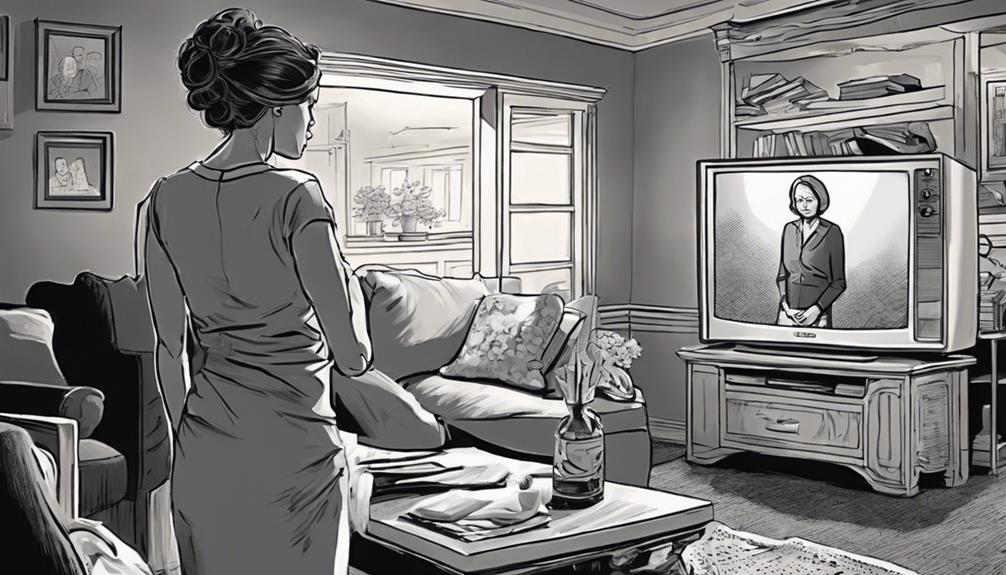When a daughter-in-law consistently avoids social gatherings where her mother-in-law will be present, it raises concerns about the underlying dynamics of their relationship. Subtle gestures like these can often be indicative of deeper issues that warrant exploration.
As we navigate through the intricacies of mother-in-law relations, we uncover various troubling indicators that shed light on the complexities at play.
Key Takeaways
- Building positive relationships requires effort, time, and communication from both parties.
- Handling criticism with empathy and setting boundaries is crucial in disliked relations.
- External influences like peers can impact perceptions and create challenges in relationships.
- Overcoming stereotypes through open dialogue, empathy, and boundary setting fosters harmonious relations.
Lack of Relationship Building Efforts
In some cases, daughters-in-law may feel disconnected due to a lack of effort in building a relationship with their mothers-in-law. It's crucial to recognize that forming a bond takes time, effort, and understanding from both sides.
Communication plays a vital role in fostering a positive relationship. Initiating conversations, sharing experiences, and showing genuine interest in each other's lives can bridge the gap. Taking the time to listen and empathize with one another's perspectives can lead to mutual respect and appreciation.
Small gestures of kindness and support can go a long way in building trust and closeness. Remember, relationships require effort from all parties involved, and investing in this connection can lead to a more harmonious and fulfilling bond.
Criticism of Parenting Skills
When facing criticism of parenting skills from a mother-in-law, it can be challenging to navigate the complexities of familial relationships. It's important to approach these situations with empathy and understanding, recognizing that differing opinions on parenting can stem from generational gaps and personal experiences. Remember, you are the parent of your child, and while advice can be valuable, ultimately, you know what's best for your family. Below is a table highlighting ways to handle criticism of parenting skills:
| Handling Criticism of Parenting Skills | Suggestions |
|---|---|
| Listen attentively | Acknowledge concerns without defensiveness |
| Communicate calmly | Share your perspective respectfully |
| Set boundaries | Politely establish limits for advice |
| Seek support | Lean on your partner or trusted friends for reassurance |
Influence From Peers
Considering the impact of peer influence on interpersonal relationships, it's essential to recognize its role in shaping perceptions and behaviors within familial dynamics. Peers can significantly impact the way daughters-in-law view their relationships with mothers-in-law through:
- Sharing negative experiences and biases.
- Reinforcing stereotypes and prejudices.
- Providing validation for negative feelings.
- Influencing communication patterns and responses.
Understanding how peers shape perspectives can help navigate and potentially improve strained mother-in-law relationships. It's important to acknowledge the external influences at play and work towards fostering understanding and empathy in these complex family dynamics.
Negative Media Impact

Understanding the impact of negative media portrayals on mother-in-law relationships can shed light on the complexities and challenges faced by individuals navigating these dynamics.
Media often sensationalizes conflicts between mothers-in-law and daughters-in-law, painting them in a negative light and perpetuating stereotypes that can influence real-life interactions.
It's important to recognize that these portrayals may not accurately reflect the diverse and nuanced relationships that exist in reality.
By being mindful of how media influences perceptions, we can work towards breaking down these barriers and fostering more understanding and empathy in our relationships.
Guardedness From Stereotypes
Navigating relationships with guardedness due to unfair stereotypes can present significant challenges for both mothers-in-law and daughters-in-law. It's crucial to recognize the impact of these stereotypes and work towards overcoming them together.
Here are four ways to address guardedness and foster better understanding:
- Open Dialogue: Creating a safe space for honest conversations can help dispel misconceptions.
- Empathy Building: Understanding each other's perspectives can bridge gaps and promote empathy.
- Setting Boundaries: Establishing clear boundaries can prevent misunderstandings and conflicts.
- Celebrating Differences: Embracing each other's uniqueness can lead to a more harmonious relationship.
Lack of Emotional Support

Guardedness from unfair stereotypes can sometimes lead to a lack of emotional support between mothers-in-law and daughters-in-law, impacting the depth of their relationship.
In times of need, emotional support is crucial for building trust and understanding. When a mother-in-law fails to provide this support, it can create feelings of isolation and resentment in the daughter-in-law.
It's important for both parties to recognize the significance of emotional support in nurturing a healthy relationship. By offering a listening ear, words of comfort, or simply being present during tough times, mothers-in-law can bridge the emotional gap and foster a more positive connection with their daughters-in-law.
Open communication and empathy are key to overcoming this barrier and strengthening their bond.
Avoidance of Direct Interactions

In relationships between mothers-in-law and daughters-in-law, avoidance of direct interactions can be a significant barrier to fostering a strong and positive connection. When direct interactions are avoided, it may lead to misunderstandings, distance, and strained relationships.
To paint a clearer picture:
- Awkward Silence: Moments of uncomfortable quietness fill the air, stifling any opportunity for open communication.
- Physical Avoidance: Physical proximity is consciously kept to a minimum, creating a palpable sense of distance.
- Avoidant Body Language: Closed-off postures and minimal eye contact further illustrate the desire to avoid meaningful interactions.
- Unspoken Tension: The unspoken tension hangs heavy, casting a shadow over potential avenues for building rapport and understanding.
Frequently Asked Questions
How Can Mothers-In-Law Proactively Work Towards Building a Strong Relationship With Their Daughters-In-Law?
We can foster strong bonds by showing genuine interest, offering support without judgment, and respecting boundaries. Listening actively, validating feelings, and creating shared experiences are crucial. Empathy, patience, and open communication build trust and understanding.
What Are Some Effective Ways for Daughters-In-Law to Address Criticism of Their Parenting Abilities From Their Mothers-In-Law?
We find addressing criticism from mothers-in-law about our parenting abilities overwhelming at times. We strive to maintain open communication, express our feelings calmly, set boundaries, and seek understanding. Building respect and empathy is key.
How Can Daughters-In-Law Navigate Influences From Their Peers' Negative Experiences With Their Own Mothers-In-Law?
Navigating influences from peers' negative experiences with mothers-in-law can be challenging. We empathize with those struggling. Sharing stories can help process emotions. Seeking positive interactions and setting boundaries are vital for maintaining healthy relationships.
What Strategies Can Mothers-In-Law Employ to Counteract the Negative Impact of Media Portrayals on Their Relationship With Their Daughters-In-Law?
We can counteract negative media portrayals by showing genuine care, offering support, and building trust. It's vital to communicate openly, understand each other's perspectives, and make efforts to bridge any gaps. Let's strengthen our bond through empathy and respect.
How Can Mothers-In-Law Break Down Barriers of Guardedness Stemming From Unfair Stereotypes to Improve Their Relationship With Their Daughters-In-Law?
We understand the importance of breaking down barriers to improve relationships. By showing genuine interest, actively listening, and engaging in positive interactions, mothers-in-law can foster trust and understanding with daughters-in-law, creating harmonious family dynamics.
Conclusion
In conclusion, navigating the complex dynamics of mother-in-law relationships can be challenging, but understanding the underlying reasons behind disliked relations is crucial. Open communication, empathy, and setting healthy boundaries can go a long way in resolving misunderstandings and fostering a more positive connection. However, it is also important to recognize when narcissists’ manipulative behaviors may be at play, further complicating the relationship. In such cases, seeking professional guidance may be necessary to protect one’s emotional well-being while working toward a more balanced dynamic.
While some may argue that these tensions are inevitable, it's important to acknowledge the impact of effort, communication, and support in fostering healthier connections.
By addressing these troubling indicators head-on and working towards mutual understanding, we can strive towards building stronger and more harmonious familial bonds.









